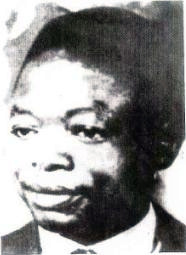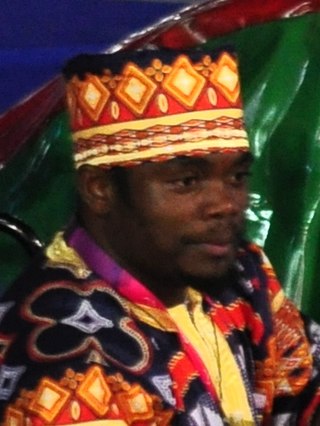| Evangelical College of Libamba | |
|---|---|
 | |
| Location | |
 | |
| Information | |
| Type | Secondary school |
| Established | 1945 |
The Evangelical College of Libamba near Makak was established in 1945 during the expansion of the Presbyterian Church in the Bassa region of Cameroon.
| Evangelical College of Libamba | |
|---|---|
 | |
| Location | |
 | |
| Information | |
| Type | Secondary school |
| Established | 1945 |
The Evangelical College of Libamba near Makak was established in 1945 during the expansion of the Presbyterian Church in the Bassa region of Cameroon.
Initially named the Institute of Evangelical Missions of Libamba, it later became the Evangelical College of Libamba. [1] The college was created to meet the need, after World War I, to educate Cameroonians up to the baccalaureate level. An elite group of American professors, such as David Gelzer, [2] [3] and European professors were assigned to the school. [4]
The college is located midway along the railway line between the stations of Makak (10 km) and Minka (2 km). [5]
The construction of the institution and its boarding school was funded by a grant of 15 million CFA francs from the French colonial administration. The land was provided by the local populations to the Société des missions évangéliques de Paris, which, along with the Presbyterian Church, [6] divided the space equally for the construction of the church and the college and its boarding school.
The inter-missionary college with a full cycle has long been one of the top secondary schools in Cameroon. The first batch of graduates [7] [8] [9] in Cameroon came from this college, although some completed their education at Lycée Leclerc in Yaoundé. [10] The play Trois prétendants...un mari , [11] a classic of Cameroonian literature, was written by Guillaume Oyônô Mbia while he was at the Evangelical College of Libamba.
| School Year [4] | Director | Nationality | Enrollment | Boarders |
|---|---|---|---|---|
| 1946-1960 | Robert Pierce | American | 200-400 | 120–150 |
| 1960-1975 | André Ngwet | Cameroonian | 300-700 | 300–400 |
| 1975-1990 | Pierre Em Njok | Cameroonian | 600-1000 | 400–600 |
| 1990-1994 | Noé Nlend | Cameroonian | 800-2000 | 500–700 |
| 1994-2001 | Collegiate Direction | - | - | - |
| 2001-2013 | Thomas Noumba | Cameroonian | - | - |
| 2013-... | Laurent Nyamb | Cameroonian | - | - |
Articles related to Cameroon include:

Ruben Um Nyobè was an anti-colonialist Cameroonian leader, slain by the French army on 13 September 1958, near his natal village of Boumnyebel, in the department of Nyong-et-Kellé in the maquis Bassa.

Andre-Marie Mbida was a Cameroonian statesman, a nationalist, the first Cameroonian to be elected Member of Parliament at the French National Assembly, a Prime Minister of Cameroon, the second African-born Prime Minister in Sub-Saharan Africa, the first Head of State of French-speaking autonomous Cameroon from 12 May 1957 to 16 February 1958, and the first political prisoner of independent Cameroon from 29 June 1962 to 29 June 1965.

The Evangelical Lutheran Church of Cameroon (EELC) is a Lutheran denomination in Cameroon. The EELC was registered as a religious body in Cameroon in 1965 and currently has approximately 253,000 members in 1,300 congregations nationwide.
Bibemi is a town and commune in Cameroon.
Bot-Makak is a town and commune in Cameroon.

The Eglise Evangelique Du Cameroun EEC (Evangelical Church of Cameroon) was born out of the European missionaries, the Paris Mission, Basel Mission and English Baptist Mission. After 1917 the Basel Mission handed over the majority of its mission stations to the Paris Mission. In 1957 the church become self-supporting and autonomous.

The Native Baptist Church of Cameroon is an association of Baptist Christian churches in Cameroon. It is affiliated with the Baptist World Alliance. The headquarters is in Douala.

Cameroonian literature includes literature in French, English and indigenous languages.
Cameroonian National Paralympic Committee is the primary body in Cameroon for the promotion of sports for people with disabilities. It has four member organizations: Cameroonian Sports Federation for the Visually Impaired (FECASDEV), Cameroonian Sports Federation for the Physically Disabled (FECASDEP), Cameroonian Federation of Sports the Intellectually Disabled (FECASDI) and the Cameroonian Federation for Sports for the Deaf (FECASSO). The President of the Cameroonian Paralympic Committee is Jean Jacques Ndoudoumou. The organization has four vice presidents, who all serve as the presidents of CNPC's member organizations.
ID sports in Cameroon are played in the country by people with intellectual disabilities. These sports are governed by Cameroonian Federation of Sports the Intellectually Disabled (FECASDI) and Special Olympics Cameroon. People with intellectual disabilities in Cameroon lack the same access to educational opportunities as people with other disability types in Cameroon. Development for sporting opportunities for them began in 1995, when Special Olympics came to Cameroon. Since then, other development activities have taken place, focusing on ID football and ID sport in general. Funding for ID sports is often limited.

Conrat Frederic Atangana is a Paralympian from Cameroon who represented his country at the 2012 Summer Paralympics in powerlifting's men's -56 kg event.
Jean-Marie Aléokol Mabiemé is a Cameroonian political figure and disability sports administrator.
Special Olympics Cameroon is the national sports federation for people with intellectual disabilities. Founded in 2005, the Chairman of the Board was Christophe Ampouam and Director was Jean-Marie Aléokol Mabiemé.
Jean Jacques Ndoudoumou is a public servant and disability sports administrator from Cameroon. An albino, he faced discrimination growing up. He later became the General Director of the Cameroonian Regulatory Board for Public Procurement (ARMP) in 2001, leaving in 2012 after he was fired in the midst of a scandal.
The Grand Prix of Literary Associations (GPLA) were launched in 2013 in Cameroon, in partnership with Brasseries du Cameroun and sponsorship by Castel Beer.
Theatre of Cameroon consists in the theatrical plays produced across Cameroon. Its history dates back to the pre-colonial time, but it has gained wide popularity since the 1970s, with practitioners such as Daniel Ndo, Dieudonné Afana and David Kemzeu. It is made of different trends, some of them are more inflected by the European theatrical tradition, some others are more attuned to the indigenous performative styles. The comic genre is presently dominating so that laughter has become synonymous with modern Cameroon theatre productions, according to Bole Butake. Theatre of Cameroon is sometimes subdivided in traditional theatre, colonial theatre, and post-independence theatre.
Events in the year 2021 in Cameroon.

Guillaume Oyônô Mbia was a Cameroonian writer. An Anglicist, he also taught at the University of Yaoundé.
Anastasie Brenda Biya Eyenga is a Cameroonian activist, rapper, and entrepreneur; and the daughter of Cameroonian president Paul Biya and First Lady Chantal Biya.